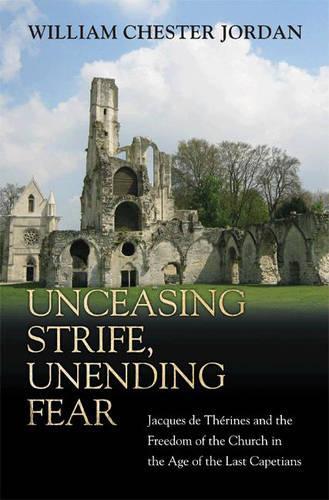
Unceasing Strife, Unending Fear: Jacques de Thrines and the Freedom of the Church in the Age of the Last Capetians
(Hardback)
Available Formats
Publishing Details
Unceasing Strife, Unending Fear: Jacques de Thrines and the Freedom of the Church in the Age of the Last Capetians
By (Author) William Chester Jordan
Princeton University Press
Princeton University Press
22nd March 2005
United States
Classifications
Professional and Scholarly
Non Fiction
Christianity
History of religion
944.024
Physical Properties
Hardback
170
Width 152mm, Height 235mm
397g
Description
This absorbing book explores the tensions within the Roman Catholic church and between the church and royal authority in France in the crucial period 1290-1321. During this time the crown tried to force churchmen to accept policies many considered inconsistent with ecclesiastical freedom and traditions--such as paying war taxes and expelling the Jews from the kingdom. William Jordan considers these issues through the eyes of one of the most important and courageous actors, the Cistercian monk, professor, abbot, and polemical writer Jacques de Therines. The result is a fresh perspective on what Jordan terms "the story of France in a politically terrifying period of its existence, one of unceasing strife and unending fear." Jacques de Therines was involved in nearly every controversy of the period: the expulsion of the Jews from France, the relocation of the papacy to Avignon, the affair of the Templars, the suppression of the "heresies" of Marguerite Porete and of the Spiritual Franciscans, and the defense of the "exempt" monastic orders' freedom from all but papal control.The stands he took were often remarkable in themselves: hostility to the expulsion of Jews and spirited defense of the Templars, for example. The book also traces the emergence of King Philip the Fair's (1285-1314) almost paranoid style of rule and its impact on church-state relations, which makes the expression of Jacques de Therines's views all the more courageous.
Reviews
"Through his narration of events great and small, Jordan evokes the mood of an age... He effortlessly covers a lot of ground in relatively few pages and there is an attractive economy to his stimulating treatment of subjects that come with considerable historiographical baggage. His book ought to have a wide readership of students and scholars alike."--Patrick Nold, H-France Review "Jordan opens a window on a remote time. It is Jordan's genius to spot that window, his achievement to let us peer through. That alone makes this work a valuable contribution to our historical perspective. It adds yet another piece to our understanding of a critical and enigmatic period."--Alan Friedlander, American Historical Review "In this book of modest size, Jordan succeeds in leading the modern reader into the world, work, and concerns of a fourteenth-century monk and scholar who occupied a not-insignificant place in the intellectual and political life of his time. Jordan's study provides new insights into debates and dissent over major church issues in the age of the last Capetians."--Kathryn L. Reyerson, Speculum
Author Bio
William Chester Jordan is Professor of History and Director of the Program in Medieval Studies at Princeton University. His books include "Europe in the High Middle Ages" (Penguin) and "The Great Famine: Northern Europe in the Early Fourteenth Century" (Princeton).
